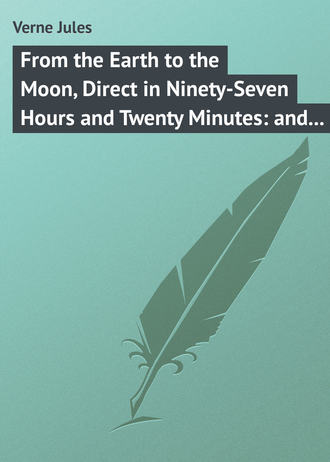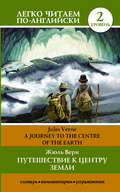
Жюль Верн
From the Earth to the Moon, Direct in Ninety-Seven Hours and Twenty Minutes: and a Trip Round It
CHAPTER XV.
THE FÊTE OF THE CASTING
During the eight months which were employed in the work of excavation the preparatory works of the casting had been carried on simultaneously with extreme rapidity. A stranger arriving at Stones Hill would have been surprised at the spectacle offered to his view.
At 600 yards from the well, and circularly arranged around it as a central point, rose 1200 reverberating ovens, each six feet in diameter, and separated from each other by an interval of three feet. The circumference occupied by these 1200 ovens presented a length of two miles. Being all constructed on the same plan, each with its high quadrangular chimney, they produced a most singular effect.
It will be remembered that on their third meeting the Committee had decided to use cast-iron for the Columbiad, and in particular the white description. This metal in fact is the most tenacious, the most ductile, and the most malleable, and consequently suitable for all moulding operations; and when smelted with pit coal, is of superior quality for all engineering works requiring great resisting power, such as cannon, steam-boilers, hydraulic presses, and the like.
Cast-iron, however, if subjected to only one single fusion, is rarely sufficiently homogeneous; and it requires a second fusion completely to refine it by dispossessing it of its last earthly deposits. So before being forwarded to Tampa Town, the iron ore, molten in the great furnaces of Coldspring, and brought into contact with coal and silicium heated to a high temperature, was carburized and transformed into cast-iron. After this first operation, the metal was sent on to Stones Hill. They had, however, to deal with 136,000,000 lbs. of iron, a quantity far too costly to send by railway. The cost of transport would have been double that of material. It appeared preferable to freight vessels at New York, and to load them with the iron in bars. This, however, required not less than sixty-eight vessels of 1000 tons, a veritable fleet, which, quitting New York on the 3rd of May, on the 10th of the same month ascended the Bay of Espiritu Santo, and discharged their cargoes, without dues, in the port at Tampa Town. Thence the iron was transported by rail to Stones Hill, and about the middle of January this enormous mass of metal was delivered at its destination.
It will be easily understood that 1200 furnaces were not too many to melt simultaneously these 60,000 tons of iron. Each of these furnaces contained nearly 140,000 lbs. weight of metal. They were all built after the model of those which served for the casting of the Rodman gun, they were trapezoidal in shape, with a high elliptical arch. These furnaces, constructed of fireproof brick, were especially adapted for burning pit coal, with a flat bottom upon which the iron bars were laid. This bottom, inclined at an angle of 25°, allowed the metal to flow into the receiving troughs; and the 1200 converging trenches carried the molten metal down to the central well.
The day following that on which the works of the masonry and boring had been completed, Barbicane set to work upon the central mould. His object now was to raise within the centre of the well, and with a coincident axis, a cylinder 900 feet high, and 9 feet in diameter, which should exactly fill up the space reserved for the bore of the Columbiad. This cylinder was composed of a mixture of clay and sand, with the addition of a little hay and straw. The space left between the mould and the masonry was intended to be filled up by the molten metal, which would thus form the walls six feet in thickness. This cylinder, in order to maintain its equilibrium, had to be bound by iron bands, and firmly fixed at certain intervals by cross-clamps fastened into the stone lining; after the castings these would be buried in the block of metal, leaving no external projection.
This operation was completed on the 8th of July, and the run of the metal was fixed for the following day.
"This fête of the casting will be a grand ceremony," said J. T. Maston to his friend Barbicane.
"Undoubtedly," said Barbicane; "but it will not be a public fête."
"What! will you not open the gates of the enclosure to all comers?"
"I must be very careful, Maston. The casting of the Columbiad is an extremely delicate, not to say a dangerous operation, and I should prefer its being done privately. At the discharge of the projectile, a fête if you like – till then, no!"
The president was right. The operation involved unforeseen dangers, which a great influx of spectators would have hindered him from averting. It was necessary to preserve complete freedom of movement. No one was admitted within the enclosure except a delegation of members of the Gun Club, who had made the voyage to Tampa Town. Among these was the brisk Bilsby, Tom Hunter, Colonel Blomsberry, Major Elphinstone, General Morgan, and the rest of the lot to whom the casting of the Columbiad was a matter of personal interest. J. T. Maston became their cicerone. He omitted no point of detail; he conducted them throughout the magazines, workshops, through the midst of the engines, and compelled them to visit the whole 1200 furnaces one after the other. At the end of the twelve-hundredth visit they were pretty well knocked up.
The casting was to take place at 12 o'clock precisely. The previous evening each furnace had been charged with 114,000 lbs. weight of metal in bars disposed cross-ways to each other, so as to allow the hot air to circulate freely between them. At daybreak the 1200 chimneys vomited their torrents of flame into the air, and the ground was agitated with dull tremblings. As many pounds of metal as there were to cast, so many pounds of coal were there to burn. Thus there were 68,000 tons of coal which projected in the face of the sun a thick curtain of smoke. The heat soon became insupportable within the circle of furnaces, the rumbling of which resembled the rolling of thunder. The powerful ventilators added their continuous blasts and saturated with oxygen the glowing plates. The operation, to be successful, required to be conducted with great rapidity. On a signal given by a cannon-shot each furnace was to give vent to the molten iron and completely to empty itself. These arrangements made, foremen and workmen waited the preconcerted moment with an impatience mingled with a certain amount of emotion. Not a soul remained within the enclosure. Each superintendent took his post by the aperture of the run.
Barbicane and his colleagues, perched on a neighbouring eminence, assisted at the operation. In front of them was a piece of artillery ready to give fire on the signal from the engineer. Some minutes before midday the first driblets of metal began to flow; the reservoirs filled little by little; and, by the time that the whole melting was completely accomplished, it was kept in abeyance for a few minutes in order to facilitate the separation of foreign substances.
Twelve o'clock struck! A gunshot suddenly pealed forth and shot its flame into the air. Twelve hundred melting-troughs were simultaneously opened and twelve hundred fiery serpents crept towards the central well, unrolling their incandescent curves. There, down they plunged with a terrific noise into a depth of 900 feet. It was an exciting and a magnificent spectacle. The ground trembled, while these molten waves, launching into the sky their wreaths of smoke, evaporated the moisture of the mould and hurled it upwards through the vent-holes of the stone lining in the form of dense vapour-clouds. These artificial clouds unrolled their thick spirals to a height of 1000 yards into the air. A savage, wandering somewhere beyond the limits of the horizon, might have believed that some new crater was forming in the bosom of Florida, although there was neither any eruption, nor typhoon, nor storm, nor struggle of the elements, nor any of those terrible phenomena which nature is capable of producing. No, it was man alone who had produced these reddish vapours, these gigantic flames worthy of a volcano itself, these tremendous vibrations resembling the shock of an earthquake, these reverberations rivalling those of hurricanes and storms; and it was his hand which precipitated into an abyss, dug by himself, a whole Niagara of molten metal!
CHAPTER XVI.
THE COLUMBIAD
Had the casting succeeded? They were reduced to mere conjecture. There was indeed every reason to expect success, since the mould had absorbed the entire mass of the molten metal; still some considerable time must elapse before they could arrive at any certainty upon the matter.
The patience of the members of the Gun Club was sorely tried during this period of time. But they could do nothing. J. T. Maston escaped roasting by a miracle. Fifteen days after the casting an immense column of smoke was still rising in the open sky and the ground burnt the soles of the feet within a radius of 200 feet round the summit of Stones Hill. It was impossible to approach nearer. All they could do was to wait with what patience they might.
"Here we are at the 10th August," exclaimed J. T. Maston one morning, "only four months to the 1st of December! We shall never be ready in time!" Barbicane said nothing, but his silence covered serious irritation.
However, daily observations revealed a certain change going on in the state of the ground. About the 15th August the vapours ejected had sensibly diminished in intensity and thickness. Some days afterwards the earth exhaled only a slight puff of smoke, the last breath of the monster enclosed within its circle of stone. Little by little the belt of heat contracted, until on the 22d August Barbicane, his colleagues, and the engineer were enabled to set foot on the iron sheet which lay level upon the summit of Stones Hill.
"At last!" exclaimed the President of the Gun Club, with an immense sigh of relief.
The work was resumed the same day. They proceeded at once to extract the interior mould, for the purpose of clearing out the boring of the piece. Pickaxes and boring irons were set to work without intermission. The clayey and sandy soils had acquired extreme hardness under the action of the heat; but by the aid of the machines, the rubbish on being dug out was rapidly carted away on railway waggons; and such was the ardour of the work, so persuasive the arguments of Barbicane's dollars, that by the 3rd of September all traces of the mould had entirely disappeared.
Immediately the operation of boring was commenced; and by the aid of powerful machines, a few weeks later, the inner surface of the immense tube had been rendered perfectly cylindrical, and the bore of the piece had acquired a thorough polish.
At length, on the 22nd of September, less than a twelvemonth after Barbicane's original proposition, the enormous weapon, accurately bored, and exactly vertically pointed, was ready for work. There was only the moon now to wait for; and they were pretty sure that she would not fail in the rendezvous.
The ecstacy of J. T. Maston knew no bounds, and he narrowly escaped a frightful fall while staring down the tube. But for the strong hand of Colonel Blomsberry, the worthy secretary, like a modern Erostratus, would have found his death in the depths of the Columbiad.
The cannon was then finished; there was no possible doubt as to its perfect completion. So, on the 6th of October, Captain Nicholl opened an account between himself and President Barbicane, in which he debited himself to the latter in the sum of 2000 dollars. One may believe that the Captain's wrath was increased to its highest point, and must have made him seriously ill. However, he had still three bets of three, four, and five thousand dollars, respectively; and if he gained two out of these, his position would not be very bad. But the money question did not enter into his calculations; it was the success of his rival in casting a cannon against which iron plates sixty feet thick would have been ineffectual, that dealt him a terrible blow.
After the 23rd of September the enclosure of Stones Hill was thrown open to the public; and it will be easily imagined what was the concourse of visitors to this spot! There was an incessant flow of people to and from Tampa Town and the place, which resembled a procession, or rather, in fact, a pilgrimage.
It was already clear to be seen that, on the day of the experiment itself, the aggregate of spectators would be counted by millions; for they were already arriving from all parts of the earth upon this narrow strip of promontory. Europe was emigrating to America.
Up to that time, however, it must be confessed, the curiosity of the numerous comers was but scantily gratified. Most had counted upon witnessing the spectacle of the casting, and they were treated to nothing but smoke. This was sorry food for hungry eyes; but Barbicane would admit no one to that operation. Then ensued grumbling, discontent, murmurs; they blamed the President, taxed him with dictatorial conduct. His proceedings were declared "un-American." There was very nearly a riot round Stones Hill; but Barbicane remained inflexible. When, however, the Columbiad was entirely finished, this state of closed doors could no longer be maintained; besides it would have been bad taste, and even imprudence, to affront the public feeling. Barbicane, therefore, opened the enclosure to all comers; but, true to his practical disposition, he determined to coin money out of the public curiosity.
It was something, indeed, to be enabled to contemplate this immense Columbiad; but to descend into its depths, this seemed to the Americans the ne plus ultra of earthly felicity. Consequently, there was not one curious spectator who was not willing to give himself the treat of visiting the interior of this metallic abyss. Baskets suspended from steam-cranes permitted them to satisfy their curiosity. There was a perfect mania. Women, children, old men, all made it a point of duty to penetrate the mysteries of the colossal gun. The fare for the descent was fixed at five dollars per head; and despite this high charge, during the two months which preceded the experiment, the influx of visitors enabled the Gun Club to pocket nearly 500,000 dollars!
It is needless to say that the first visitors of the Columbiad were the members of the Gun Club. This privilege was justly reserved for that illustrious body. The ceremony took place on the 25th September. A basket of honour took down the President, J. T. Maston, Major Elphinstone, General Morgan, Colonel Blomsberry, and other members of the club, to the number of ten in all. How hot it was at the bottom of that long tube of metal! They were half suffocated. But what delight! What ecstasy! A table had been laid with six covers on the massive stone which formed the bottom of the Columbiad, and lighted by a jet of electric light resembling that of day itself. Numerous exquisite dishes, which seemed to descend from heaven, were placed successively before the guests, and the richest wines of France flowed in profusion during this splendid repast, served nine hundred feet beneath the surface of the earth!
The festival was animated, not to say somewhat noisy. Toasts flew backwards and forwards. They drank to the earth and to her satellite, to the Gun Club, the Union, the moon, Diana, Phœbe, Selene, the "peaceful courier of the night"! All the hurrahs, carried upwards upon the sonorous waves of the immense acoustic tube, arrived with the sound of thunder at its mouth; and the multitude ranged round Stones Hill heartily united their shouts with those of the ten revellers hidden from view at the bottom of the gigantic Columbiad.
J. T. Maston was no longer master of himself. Whether he shouted or gesticulated, ate or drank most, would be a difficult matter to determine. At all events, he would not have given his place up for an empire, "not even if the cannon – loaded, primed, and fired at that very moment – were to blow him in pieces into the planetary world."
CHAPTER XVII.
A TELEGRAPHIC DESPATCH
The great works undertaken by the Gun Club had now virtually come to an end; and two months still remained before the day for the discharge of the shot to the moon. To the general impatience these two months appeared as long as years! Hitherto the smallest details of the operation had been daily chronicled by the journals, which the public devoured with eager eyes.
Just at this moment a circumstance, the most unexpected, the most extraordinary and incredible, occurred to rouse afresh their panting spirits, and to throw every mind into a state of the most violent excitement.
One day, the 30th September, at 3.47 p.m., a telegram, transmitted by cable from Valentia (Ireland) to Newfoundland and the American mainland, arrived at the address of President Barbicane.
The President tore open the envelope, read the despatch, and, despite his remarkable powers of self-control, his lips turned pale and his eyes grew dim, on reading the twenty words of this telegram.
Here is the text of the despatch, which figures now in the archives of the Gun Club: —
"France, Paris,
"30 September, 4 a. m.
"Barbicane, Tampa Town, Florida, United States.
"Substitute for your spherical shell a cylindro-conical projectile. I shall go inside. Shall arrive by steamer 'Atlanta.'
"Michel Ardan."
CHAPTER XVIII.
THE PASSENGER OF THE "ATLANTA."
If this astounding news, instead of flying through the electric wires, had simply arrived by post in the ordinary sealed envelope, Barbicane would not have hesitated a moment. He would have held his tongue about it, both as a measure of prudence, and in order not to have to reconsider his plans. This telegram might be a cover for some jest, especially as it came from a Frenchman. What human being would ever have conceived the idea of such a journey? and, if such a person really existed, he must be an idiot, whom one would shut up in a lunatic ward, rather than within the walls of the projectile.
The contents of the despatch, however, speedily became known; for the telegraphic officials possessed but little discretion, and Michel Ardan's proposition ran at once throughout the several States of the Union. Barbicane had, therefore, no further motive for keeping silence. Consequently, he called together such of his colleagues as were at the moment in Tampa Town, and without any expression of his own opinions simply read to them the laconic text itself. It was received with every possible variety of expressions of doubt, incredulity, and derision from every one, with the exception of J. T. Maston, who exclaimed, "It is a grand idea, however!"
When Barbicane originally proposed to send a shot to the moon every one looked upon the enterprise as simple and practicable enough – a mere question of gunnery; but when a person, professing to be a reasonable being, offered to take passage within the projectile, the whole thing became a farce, or, in plainer language a humbug.
One question, however, remained. Did such a being exist? This telegram flashed across the depths of the Atlantic, the designation of the vessel on board which he was to take his passage, the date assigned for his speedy arrival, all combined to impart a certain character of reality to the proposal. They must get some clearer notion of the matter. Scattered groups of inquirers at length condensed themselves into a compact crowd, which made straight for the residence of President Barbicane. That worthy individual was keeping quiet with the intention of watching events as they arose. But he had forgotten to take into account the public impatience; and it was with no pleasant countenance that he watched the population of Tampa Town gathering under his windows. The murmurs and vociferations below presently obliged him to appear. He came forward, therefore, and on silence being procured, a citizen put point-blank to him the following question: – "Is the person mentioned in the telegram, under the name of Michel Ardan, on his way here? Yes or no."
"Gentlemen," replied Barbicane, "I know no more than you do."
"We must know," roared the impatient voices.
"Time will show," calmly replied the President.
"Time has no business to keep a whole country in suspense," replied the orator. "Have you altered the plans of the projectile according to the request of the telegram?"
"Not yet, gentlemen; but you are right! we must have better information to go by. The telegraph must complete its information."
"To the telegraph!" roared the crowd.
Barbicane descended; and heading the immense assemblage, led the way to the telegraph office. A few minutes later a telegram was despatched to the secretary of the underwriters at Liverpool, requesting answers to the following queries: —
"About the ship 'Atlanta' – when did she leave Europe? Had she on board a Frenchman named Michel Ardan?"
Two hours afterwards Barbicane received information too exact to leave room for the smallest remaining doubt.
"The steamer 'Atlanta' from Liverpool put to sea on the 2nd October, bound for Tampa Town, having on board a Frenchman borne on the list of passengers by the name of Michel Ardan."
That very evening he wrote to the house of Breadwill and Co., requesting them to suspend the casting of the projectile until the receipt of further orders. On the 20th October, at 9 a.m., the semaphores of the Bahama Canal signalled a thick smoke on the horizon. Two hours later a large steamer exchanged signals with them. The name of the Atlanta flew at once over Tampa Town. At four o'clock the English vessel entered the Bay of Espiritu Santo. At five it crossed the passage of Hillisborough Bay at full steam. At six she cast anchor at Port Tampa. The anchor had scarcely caught the sandy bottom when 500 boats surrounded the "Atlanta," and the steamer was taken by assault. Barbicane was the first to set foot on deck, and in a voice of which he vainly tried to conceal the emotion, called "Michel Ardan."
"Here!" replied an individual perched on the poop.
Barbicane, with arms crossed, looked fixedly at the passenger of the "Atlanta."
He was a man of about 42 years of age, of large build, but slightly round-shouldered. His massive head momentarily shook a shock of reddish hair, which resembled a lion's mane. His face was short with a broad forehead, and furnished with a moustache as bristly as a cat's, and little patches of yellowish whisker upon full cheeks. Round, wildish eyes, slightly near-sighted, completed a physiognomy essentially feline. His nose was firmly shaped, his mouth particularly sweet in expression, high forehead, intelligent and furrowed with wrinkles like a newly-ploughed field. The body was powerfully developed and firmly fixed upon long legs. Muscular arms, and a general air of decision gave him the appearance of a hardy, jolly companion. He was dressed in a suit of ample dimensions, loose neckerchief, open shirt-collar, disclosing a robust neck; his cuffs were invariably unbuttoned, through which appeared a pair of red hands.
On the bridge of the steamer, in the midst of the crowd, he bustled to and fro, never still for a moment, "dragging his anchors," as the sailors say, gesticulating, making free with everybody, biting his nails with nervous avidity. He was one of those originals which nature sometimes invents in the freak of a moment, and of which she then breaks the mould.
Amongst other peculiarities, this curiosity gave himself out for a sublime ignoramus, "like Shakespeare," and professed supreme contempt for all scientific men. Those "fellows," as he called them, "are only fit to mark the points, while we play the game." He was, in fact, a thorough Bohemian, adventurous, but not an adventurer; a hair-brained fellow, a kind of Icarus, only possessing relays of wings. For the rest, he was ever in scrapes, ending invariably by falling on his feet, like those little pith figures which they sell for children's toys. In two words, his motto was "I have my opinions," and the love of the impossible constituted his ruling passion.
Such was the passenger of the "Atlanta," always excitable, as if boiling under the action of some internal fire by the character of his physical organization. If ever two individuals offered a striking contrast to each other, these were certainly Michel Ardan and the Yankee Barbicane; both, moreover, being equally enterprising and daring, each in his own way.
The scrutiny which the President of the Gun Club had instituted regarding this new rival was quickly interrupted by the shouts and hurrahs of the crowd. The cries became at last so uproarious, and the popular enthusiasm assumed so personal a form, that Michel Ardan, after having shaken hands some thousands of times, at the imminent risk of leaving his fingers behind him, was fain at last to make a bolt for his cabin.
Barbicane followed him without uttering a word.
"You are Barbicane, I suppose?" said Michel Ardan in a tone of voice in which he would have addressed a friend of twenty years' standing.
"Yes," replied the President of the G. C.
"All right! how d'ye do, Barbicane? how are you getting on – pretty well? that's right."
"So," said Barbicane without further preliminary, "you are quite determined to go."
"Quite decided."
"Nothing will stop you?"
"Nothing. Have you modified your projectile according to my telegram."
"I waited for your arrival. But," asked Barbicane again, "have you carefully reflected?"
"Reflected? have I any time to spare? I find an opportunity of making a tour in the moon, and I mean to profit by it. There is the whole gist of the matter."
Barbicane looked hard at this man who spoke so lightly of his project with such complete absence of anxiety. "But, at least," said he, "you have some plans, some means of carrying your project into execution?"
"Excellent, my dear Barbicane; only permit me to offer one remark: – My wish is to tell my story once for all, to everybody, and then to have done with it; then there will be no need for recapitulation. So, if you have no objection, assemble your friends, colleagues, the whole town, all Florida, all America if you like, and to-morrow I shall be ready to explain my plans and answer any objections whatever that may be advanced. You may rest assured I shall wait without stirring. Will that suit you?"
"All right," replied Barbicane.
So saying, the President left the cabin and informed the crowd of the proposal of Michel Ardan. His words were received with clappings of hands and shouts of joy. They had removed all difficulties. To-morrow every one would contemplate at his ease this European hero. However, some of the spectators, more infatuated than the rest, would not leave the deck of the "Atlanta." They passed the night on board. Amongst others, J. T. Maston got his hook fixed in the combing of the poop, and it pretty nearly required the capstan to get it out again.
"He is a hero! a hero!" he cried, a theme of which he was never tired of ringing the changes; "and we are only like weak, silly women, compared with this European!"
As to the president, after having suggested to the visitors it was time to retire, he re-entered the passenger's cabin, and remained there till the bell of the steamer made it midnight.
But then the two rivals in popularity shook hands heartily and parted on terms of intimate friendship.






